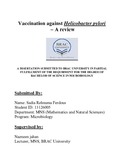Vaccination against Helicobacter pylori – a review

View/Open
Date
2018Publisher
BRAC UniversityAuthor
Ferdous, Sadia RehnumaMetadata
Show full item recordAbstract
Since the colonization of H. pylori has sweeping wellbeing results, it speaks to a huge general
wellbeing challenge. Current medicines utilize numerous anti-infection agents in blend with
corrosive concealment pharmaceuticals to annihilate it. Because of an expansion in antimicrobial
obstruction, it is currently harder to dispose of, and the improvement of an antibody as
an elective treatment is of expanded intrigue.
In this way, H. pylori is the significant reason for gastric malignancy around the world. It has
been named a class ⅰ cancer-causing agent by the World Health Organization. Since its revelation
in the mid-eighties by Warren and Marshall, inquire about has been centered on the examination
of H. pylori science, have pathogen communication, anticipation and treatment. Despite the fact
that H. pylori incites a solid humoral and nearby cell invulnerable reaction, the pathogen isn't
cleared and sets up a ceaseless contamination after experiences in adolescence. The capacity to
colonize the stomach is interceded by a few harmfulness factors that change the host condition,
elevate grip to the epithelium, impact the gastric aggravation and prompt safe avoidance. H.
pylori can be annihilated by anti-toxin treatment in mix with a proton-pump inhibitor, yet
viability is diminishing. Current treatments are costly, have symptoms and add to expanding
anti-toxin opposition, underlining the requirement for novel therapeutics. That is the reason
immunization advancement against H. pylori remains a focal point of research. Advancement is
made yet is incremental. There is requirement for a still better comprehension of the defensive
instrument and for enhancing adequacy, sooner rather than later.
